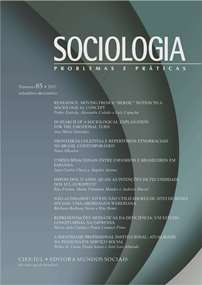Não-alinhados? Jovens não utilizadores de sites de redes sociais: uma abordagem weberiana
DOI:
https://doi.org/10.7458/SPP2017856943Palavras-chave:
Jovens, Sites de Redes Sociais, Não utilização, Exclusão digital, tipo idealResumo
Em resposta à predominância dos estudos sobre jovens e utilização de sites de redes sociais (SRS), este artigo analisa narrativas juvenis de não utilização. Baseado em 30 entrevistas a jovens adultos, exploram-se significados de exclusão digital voluntária de plataformas digitais que parecem estar progressivamente embebidas no dia a dia deste grupo social. Os resultados mostram que a não utilização é diversa e transiente, relacionando-se com identidade(s) e ações sociais. Assim, identificam-se quatro tipos de não utilizadores: desistentes, resistentes, utilizadores indiretos e potencialmente convertidos. Esta tipologia questiona as dicotomias presentes na literatura em torno de utilização e não utilização, acesso e não acesso, e consumo e não consumo. Sugerem-se a perspetiva sociológica e o “tipo ideal” de Max Weber como abordagem analítica para a desconstrução destas dicotomias.Downloads
Publicado
2017-07-26
Edição
Secção
Artigos
Licença
Autores que publicam nesta revista concordam com os seguintes termos:
a. Autores conservam os direitos de autor e concedem à revista o direito de primeira publicação, com o trabalho simultaneamente licenciado sob a Licença Creative Commons Attribution que permite a partilha do trabalho com reconhecimento da autoria e publicação inicial nesta revista.
b. Autores têm autorização para assumir contratos adicionais separadamente, para distribuição não-exclusiva da versão do trabalho publicada nesta revista (ex.: publicar em repositório institucional ou como capítulo de livro), com reconhecimento de autoria e publicação inicial nesta revista.


